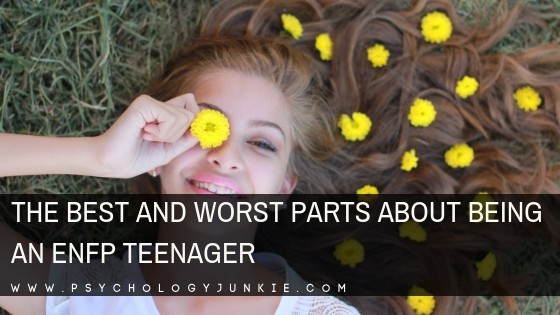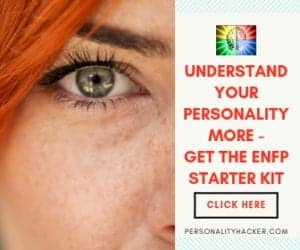The Best and Worst Parts About Being an ENFP Teenager
ENFPs are one of the most-loved Myers-Briggs® personality types. With their contagious enthusiasm, compassion, and visionary ambition, they make life feel like an adventure to be grasped. ENFP teens bring liveliness and fun to the world around them. However, there are some unique struggles that these teens face and some specific needs that will make understanding the ENFP teen easier.
But first, let’s take a quick look at the teenage brain:

Some people get really judgmental about teenagers, and some people attribute normal teenage behaviors to a certain personality type. So before we get into the pros and cons of being an ENFP teen, let’s take a look at the teenage brain:
Adolescent brains have fast-growing synapses and sections that remain disconnected. Because of this, teens of ALL personality types are more easily influenced by their environment and are more prone to making impulsive decisions. The brain grows and changes constantly in young people – in fact, in adolescence only about 80 percent of the brain is developed. The last section of the brain to connect and develop is the frontal lobe, which is responsible for cognitive reasoning, planning, and judgment. This explains why teenagers struggle with foreseeing the possible implications of their current actions and choices. It also means planning for college can be a nightmare for any teenager.
It’s not all bad news for teens, though! Because the neural networks that help brain cells communicate are enlarging in teen brains, teens are able to learn information much more easily than adults!
Patience, understanding, and gentle guidance are important for parents of any teen, regardless of their personality type.
Now let’s get back to learning about the ENFP teenager!
Not sure what your personality type is? Take our new personality questionnaire!
The Best and Worst Parts About Being an ENFP Teenager
#1 – The Pressure of Making Long-Term Decisions is Overwhelming
ENFPs use a mental process called Extraverted Intuition (Ne) to interpret the world around them. Ne is always seeing connections, possibilities, and relationships in the outside world. People who use Ne in the dominant position (ENFPs and ENTPs) like to keep their options open and explore a variety of interests before settling on a plan for their lives. Add to this the mental re-wiring going on in the teenage brain and you’ve got a recipe for intense frustration. Young ENFPs often feel pressured and coerced into making long-term decisions as they reach their teen years. They see so many options that they simply can’t figure out what to decide, or they repeatedly change their mind. This can cause parents frustration, but it’s important to have patience. Let them explore their options, let them do internships, read, or watch college lectures online. It’s better to have an ENFP who’s passionate about their goals than one who’s stressed, overwhelmed, and backed into a corner.
One ENFP I spoke with said that if she could talk to her teenage self she would say, “That it’s perfectly fine to not know exactly what you want to do, and to explore all the options you’re thinking of, no matter how “unrealistic” or “impractical” they might seem. You’re capable of whatever you set your mind to do.”
#2 – Convention Is Boring, But Everyone’s Trying to Push it on You
As ENFPs reach adolescence they become more and more turned-off by traditional rules and conventions. They want to question things, but more often than not their questions are stifled. ENFPs like being different and are drawn to styles and theories that contradict what’s “normal”. Figuring out their own unique identity and purpose in life is very important to them. This is in part a healthy stage that all teenagers go through. It is also more pronounced in ENFPs because these types naturally tend to question norms, rules, and long-standing traditions more than other types. As a parent, listening with compassion and steady understanding is important. If a parent tries to laugh off an ENFPs idea as childish then they may find that their child closes off their secret world from them. This is a position no parent wants to be in. The skepticism and rule-breaking nature of ENPs can help us see new ways of living and shine a light on rules that are outdated or meaningless.
“Believe in yourself and your ideals. Just because others have tighter boundaries on their imaginations doesn’t mean that’s right for you. And don’t try so hard to fit in. Just be yourself.”
– Peg, an ENFP
#3 – You’re Seen as Argumentative Because You Naturally See 100 Sides to Everything
ENFP teens are developing their intuition at a rapid pace. Because of this they see a thousand sides to any given rule or situation. On top of this, they are constantly seeking more independence and freedom to pursue their own dreams and set their own limits. They tend to find many rules meaningless and are adept at arguing against limits that they feel constrain their free-spirit. While many comics and stereotypes about ENFPs paint them as “always sunny”, the parent of an ENFP teen might feel very differently, especially if that parent is an avid enforcer of rules. ENFPs need the ability to exert their independence, try (and maybe even fail) at their own pursuits, and explore their options safely.
“If I could give my teenage self advice, I would say: “Go get your passport. Make plans and write them down. Make to-do lists. Push back on bossy people. Learn to decipher your true feelings, convictions, and boundaries and let those be bigger than anyone else’s opinion of you.” I think it would have been beneficial to have had someone take me seriously, encouraged me to take myself seriously, and helped me to translate my dreams into practical steps.”
– Melony, an ENFP
#4 – You Over-Extend Yourself
ENFPs like variety and activity, but this means that they tend to take on more than they can handle. It can be difficult for them to say no to anything that sounds interesting, new, or appeals to their compassion. As a result they can wind up overwhelmed by the sheer amount of work they take on. Structuring their responsibilities is also hard for these types because they tend to get distracted and start lots of new projects before finishing the old ones. Parents can help by letting them know that it’s okay to say no to things. It’s also important for ENFPs to get time alone to understand what’s important to them, what their values are, what they believe in. If they make a regular habit of doing this then they can then prioritize their responsibilities in order of greatest to least.
“The real trick for ENFPs is to learn to narrow their focus so they can avoid scattering their talents over too wide a field. Learning to set and then stick with priorities is another important life lesson for ENFPs.”
– Paul D. Tieger & Barbara Barron-Tieger, Nurture by Nature – Understand Your Child’s Personality Type – And Become a Better Parent
#5 – You Forget About Your Health or Obsess Over It
Every personality type has an inferior function. This function is one that we tend to forget about or de-value in our own lives. For the ENFP this function is called Introverted Sensing, or “Si” for short. This function is very focused on maintaining inner health, comfort, and a sense of inner satisfaction and consistency. It’s also something we tend to use when we create routines and focus extensively on specific facts and personal experiences. Because this function is inferior for ENFPs they can lose track of their own physical needs. They tend to get wrapped up in ideas and projects and forget to eat or drink. They often lie awake at night sorting through ideas and possibilities and feelings. Eventually this can lead to burnout or even sickness. When this happens ENFPs can “flip a switch” and become uncharacteristically paranoid about their physical needs. They may start to feel like physical symptoms are a sign of a much bigger problem or worry that they have life-threatening illnesses. Parents of teen ENFPs can help by setting up reminders for them to drink enough water (this can be done through apps on the phone!). Minimizing screen time at night can also help ENFPs to fall asleep easier. Some ENFPs have mentioned that listening to ASMR helps them to calm their mind.
The Joys of Being a Teenage ENFP
Being a teenager and an ENFP isn’t all about struggles and hardships. ENFPs long to find their place in the world and they greatly desire to figure out their significance and purpose. They are very passionate teenagers and tend to pursue causes that will help people, animals, or the environment. They don’t mind speaking up in defense of values that are being persecuted or overlooked. The ENFP teen has an important place in our world. They can help us to have a conscience for what’s ethical and right. They can help us to think outside of our traditions and rules and analyze whether we’re living in a way that is truly in accordance with our moral compass. ENFPs can also be determined entrepreneurs; they tend to more motivated when they can work for themselves or create their own businesses.
Young ENFPs tend to see many options and exciting pathways before them. Life is always full of opportunity. There are windows gleaming with adventure at every turn. The world is full of new places to explore, new people to meet, and new theories to play with. Everything is waiting for them. The sheer immensity of what’s possible can be a balm to their soul. This ability to see potential and possibility gives them a resilience and adaptability that is admirable.
A Final Thought
ENFPs don’t mind stepping outside the box to pursue their unique interests and identities. Sometimes this can lead to misunderstandings and bullying. One ENFP friend had these encouraging words to say to ENFPs in these situations.
“It’s hard being the odd one in high school, but that’s exactly why people will love you when you’ve left. Just know it’ll get better.”
– Madeline
ENFPs need support, compassion, and assurance as teenagers. They need parents and friends who are willing to accept them as they are and show them unconditional love. They need to explore their quirks and their dreams and their passions. They need to express their true feelings without fear of being patronized, condescended to, or shut down. It’s important for parents to let them speak and give them space to figure out what they want in life.
“My advice to my teenage self (if I could) is that it’s okay to feel and to be yourself. Don’t deny the emotions and values you hold with significance. Then again, “Be the person who you wanted to save you as a child.”
– Nate
What Are Your Thoughts?
Did you enjoy this article? Do you have any thoughts or insights to add? Let us know in the comments! Want to know more about the ENFP personality type? Get your starter kit here!
This article contains affiliate links. I only recommend products I truly believe in.
Other Articles You Might Enjoy:
10 Things That Excite the ENFP Personality Type
Here’s What Makes ENFPs and ESFPs So Amazing (and How to Tell Them Apart!)
What ENFPs Do When They Get Really Stressed Out
Three Weird and Wonderful Secrets About the ENFP Personality Type















I’m an 18-year-old ENFP, and this is so accurate! Fortunately I didn’t have to struggle with being unconventional, because I was homeschooled (and it was actually normal to be weird ????). But I forget to eat and shower all the time. Just today I almost collapsed, and then realized I hadn’t eaten for eight hours. And I totally agree with you on being seen as argumentative. I have an ESTJ Dad and an ISFJ Mom, so that should give you enough of a picture of what it was like being a teen ????
Thanks so much for writing this!
OMG, I’m an ENFP too! I’m 18( Korean age), and I’m forgetting to eat too! (sometimes)… Everyone was calling me weird, but it’s totally fine. My dad is an ESTJ too😂😂😂😂! My mom took 16personalities test (I don’t trust it), she was typed as an ENFP. She seems nothing alike ENFP. She definitely isn’t a Ne user… Or it’s inferior (maybe tert)
Turning 18 in 2 months and I feel very exposed like my whole life was put into a book and I just read it. Also Thankyou article, I’m off to brush my teeth.
Hi, I’m Emily and my reaction to this article is definitely:
“This is extremely accurate.”
I’m a teen ENFP who can’t stop jumping from one project to the other and who spends so much time rushing around and documenting all of my new ideas for the future in various different notebooks. I also get so caught up in different things that I always forget to go to the bathroom and I have to designate a time each day to drink water (it’s so easy to forget!) or have my bottle next to me while I’m brainstorming.
Thanks a lot for the article – it’s cleared a lot up and I feel better about myself and my “non-conformity”. Sometimes it’s hard being the odd one out. I would never pretend to be someone I’m not, but I do get a hard time when I fully express myself…and that’s influenced how much of my inner world I reveal to people. Unfortunately, I haven’t found anyone that I completely trust 1000% with it. But I’m optimistic and I’ve got a whole life to live, so I’m going to live it to the fullest and stay on the bright side no matter what!
Thank you! 🥺